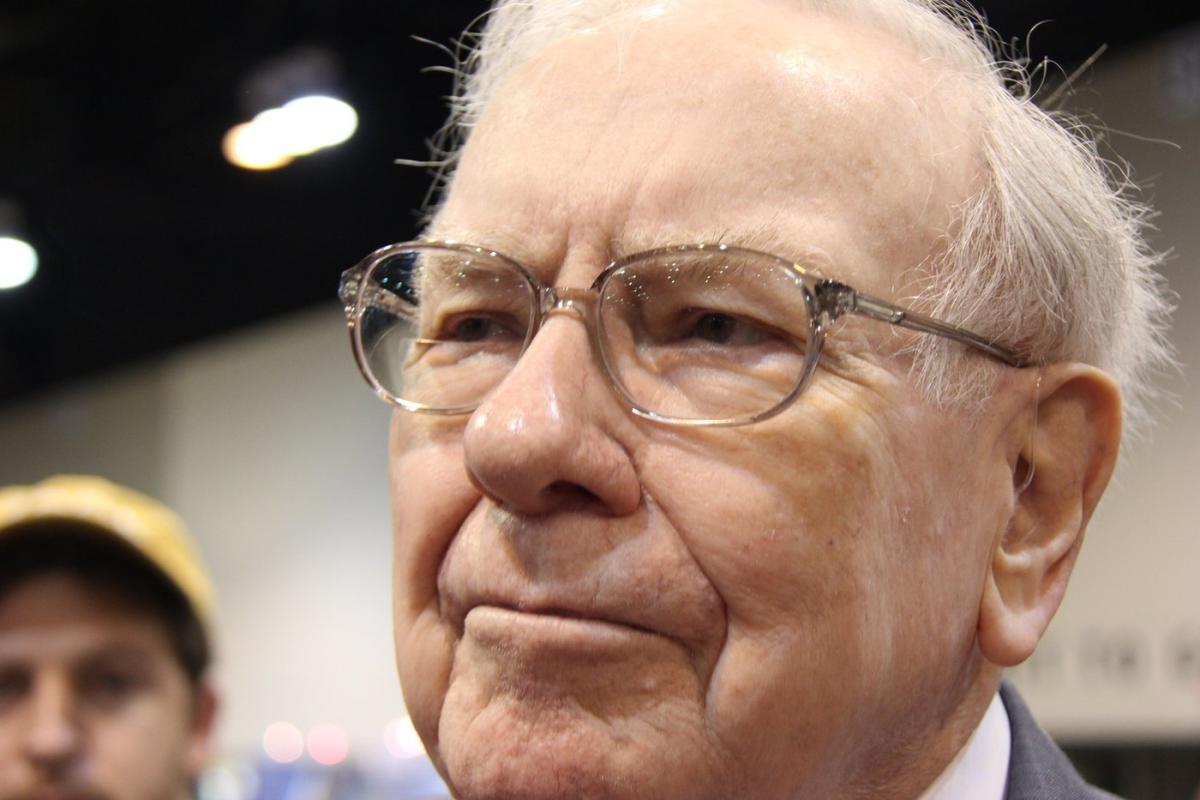
Few, if any, money managers command the attention of professional and everyday investors like… Berkshire Hathaway (NYSE: BRK.A)(NYSE: BRK.B) Warren Buffett, CEO. Since taking over in the mid-1960s, he has overseen a cumulative return on his company’s Class A stock (BRK.A) of more than 5,500,000% and briefly witnessed his company surpass a market capitalization of $1 trillion.
Investors often eagerly await Berkshire’s quarterly release of Form 13F, which gives investors a concise look at what Wall Street’s top fund managers bought and sold in the past quarter.
But there’s one thing that might come as a bit of a surprise: Berkshire Hathaway’s 13F doesn’t tell the full story of what’s under the company’s hood.


The Oracle of Omaha Has a Secret Portfolio of $602 Million and Three AI Stocks Are Getting the Thumbs Up
In 1998, Berkshire Hathaway acquired General Re in a stock deal valued at $22 billion. While the crown jewel of this deal was General Re’s reinsurance operations, it also owned a specialized investment firm known as New England Asset Management (NEAM). When the deal closed in December 1998, Buffett became the new owner of NEAM.
Institutional investors with at least $100 million in assets under management are required to file a Form 13F with the Securities and Exchange Commission. In the quarter ended June, New England Asset Management held $602 million in securities and is therefore required to disclose which shares have been bought and sold.
Although Warren Buffett doesn’t manage NEAM’s assets in the same way he does the $309 billion, 43-stock portfolio he oversees at Berkshire Hathaway, what NEAM owns is ultimately under the umbrella of Buffett’s company. So New England Asset Management is, in effect, Warren Buffett’s secret $602 million portfolio.
Similar to Buffett’s trading activity over the past two years, the advisors overseeing NEAM’s portfolio have predominantly been net sellers of equities. What was once a portfolio that boasted $6.3 billion in assets, as of the quarter ended March 2022, now holds “only” $602 million in securities, as of June 30, 2024.
Most notably, Buffett’s secret portfolio has been divesting its holdings in three high-growth artificial intelligence (AI) stocks, and No, Nvidia He is not one of them.
Broadcom
The first high-flying AI stock being shunned by asset managers in Buffett’s shadow portfolio is the networking solutions specialist. Broadcom (NASDAQ:AVGO)New England Asset Management reduced its stake in the company by 19% in the quarter ended June.
There’s no denying that Broadcom has been a clear beneficiary of the AI boom. Its networking solutions, which are designed to reduce tail latency and maximize the processing potential of AI graphics processing units (GPUs), have quickly become staples in enterprise data centers tasked with running generative AI solutions and training large language models.
But what investors, including those at NEAM, might be overlooking is that Broadcom is much more than just a provider of AI networking solutions. For example, it is a leading supplier of next-generation smartphone chips and wireless accessories. Wireless carriers upgrading their networks to support 5G download speeds has led to a sustained cycle of device replacement that clearly benefits Broadcom.
Broadcom is also a key supplier of optical components used in automated industrial equipment, next-generation vehicle networking solutions, and cybersecurity solutions.
I would be remiss if I didn’t also mention that Broadcom occasionally turns to acquisitions to expand its ecosystem of products and services and enhance cross-selling opportunities. Its latest acquisition — a $69 billion deal to buy cloud-based virtualization software company VMware, which closed last year — should help it become a key player in private and hybrid enterprise clouds.
The only logical reason to sell Broadcom stock is if you believe the AI bubble is going to burst, and there are plenty of signs suggesting this could happen. While the AI bubble bursting would undoubtedly hurt Broadcom stock, its business is well diversified and can weather any situation that comes its way.


Microsoft
A second AI stock that money managers in Warren Buffett’s secret $602 million portfolio seem to be putting off is the second-largest publicly traded company, Microsoft (NASDAQ: MSFT)During the second quarter, just over 20% of NEAM’s stake in Microsoft left.
Microsoft is integrating AI into a variety of its operating segments. This includes offering generative AI solutions to its Azure customers. Azure is the world’s second-largest cloud infrastructure services platform and has consistently been Microsoft’s fastest-growing operating segment. Given that most companies are still in the early stages of their cloud investment cycle, Azure is likely to see sustained double-digit sales growth.
Microsoft has also been investing inorganically in the AI revolution. For example, it is a major investor in OpenAI, the company behind the popular chatbot ChatGPT. OpenAI helped Microsoft relaunch its Bing search engine and Edge browser with AI capabilities.
In addition, Microsoft and Black Rock Last week, Microsoft announced plans to launch a $30 billion fund that will invest in various AI infrastructures. Microsoft has plenty of cash, and its management team has demonstrated a willingness to expand its ecosystem of products and services by putting it to work.
So why sell a fifth of NEAM’s stake in Microsoft if the company is firing on all cylinders? The answer probably lies in Microsoft’s valuation.
At the close of trading on September 17, Microsoft was valued at nearly 32 times its fiscal 2026 (ending June 30, 2026) consensus earnings per share. This is about 7% higher than its average forward price-to-earnings (P/E) multiple over the previous five-year period, and is a somewhat aggressive earnings multiple considering how expensive the stock market is right now.
Alphabet
The third AI stock in Buffett’s secret $602 million portfolio to be sent to the chopping block is Google’s parent company. Alphabet (NASDAQ: GOOGL)(NASDAQ:GOOG)Specifically, NEAM’s managers sold nearly 28% of their fund’s stake in Alphabet (GOOGL) Class A shares in the second quarter.
Similar to Microsoft, Alphabet should see much of its AI-related growth come from integrating generative AI solutions with its cloud infrastructure services platform.
Google Cloud is the world’s third-largest cloud infrastructure services platform in terms of total spending, and last year it began generating consistent profits. Since the margins associated with cloud services are typically much higher than advertising margins, Google Cloud has the potential to become Alphabet’s primary driver of operating cash flow by the end of the decade.
For the time being, Alphabet’s core operating segment remains its Google search engine. For more than nine years, Google has accounted for no less than 90% of the monthly share of global Internet searches. This makes it the preferred choice for advertisers and gives Alphabet phenomenal power to set ad prices.
In addition, Alphabet has nearly $111 billion in cash, cash equivalents and marketable securities. Like Microsoft, Alphabet’s balance sheet gives it a level of financial flexibility that few companies can match.
Considering Alphabet is historically cheap, NEAM’s sale of Alphabet stock is somewhat puzzling. The best guess as to why Buffett’s secret portfolio is dumping Alphabet stock is the increasing likelihood that the AI bubble will burst and the stock, as a whole, will be expensive.
Should you invest $1,000 in Broadcom right now?
Before buying Broadcom stock, consider the following:
He Motley Fool Stock Advisor The team of analysts has just identified what they believe to be the Top 10 Stocks for investors to buy now…and Broadcom wasn’t one of them. The 10 stocks that made the cut could yield outsized returns in the years ahead.
Consider when Nvidia I made this list on April 15, 2005… if you invested $1,000 at the time of our recommendation, You would have $710,860!*
Stock market advisor offers investors an easy-to-follow blueprint for success, including guidance on how to build a portfolio, regular analyst updates, and two new stock picks each month. Stock market advisor The service has more than quadruple the return of the S&P 500 since 2002*.
See all 10 actions »
*Stock Advisor performance as of September 16, 2024
Alphabet executive Suzanne Frey is a member of The Motley Fool’s board of directors. Sean Williams has positions in Alphabet. The Motley Fool has positions in and recommends Alphabet, Berkshire Hathaway, Microsoft, and Nvidia. The Motley Fool recommends Broadcom and recommends the following options: January 2026 $395 call options on Microsoft and January 2026 $405 call options on Microsoft. The Motley Fool has a disclosure policy.
Warren Buffett’s Secret Portfolio Is to Dump Shares of Three Super-Powerful AI Companies (No, Not Nvidia!) was originally published by The Motley Fool
